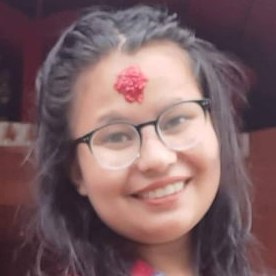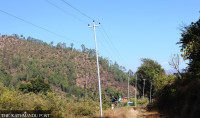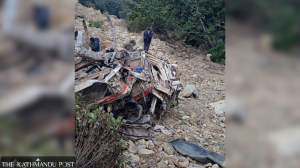Karnali Province
Birendranagar reels under acute water scarcity
Residents say in all of the municipality’s 16 wards, water is being supplied for just once or twice a week, which is woefully inadequate.
Tripti Shahi
Rama Bhandari, a resident of Bangesimal in ward 2 of Birendranagar Municipality in Surkhet district, has been struggling to manage water for household consumption for the past one month. Water is supplied only once or twice a week to the tap at her house and that also for a limited time which is not enough to meet her needs, she says.
“The well in our compound dried up back in March,” Bhandari said. “Nowadays I have to rely on my neighbours for water. But they also don’t have enough supply and could refuse to share water with me any day.”
Although Bhandari has been managing drinking water just enough for her family, there is no water for other household purposes.
Birendranagar, the provincial headquarters of Karnali, has been suffering from water shortage for the past four months. All 16 wards of Birendranagar Municipality have been reporting water shortages.
The municipality has never had enough supply of water for households but since April, the shortage of water has become more pronounced, says Padma Devi Shahi, a resident of ward 2. “Earlier we had water flowing from the taps, and although the supply wasn’t sufficient, we could still manage,” said Shahi. “But now it’s difficult to meet our water needs with wells running dry.”
Shahi says the hot weather in Birendranagar has made life more difficult without water. “I haven’t been able to give enough water to my cattle. There is no water in the tap or in the well, and it has not rained. We have no option but to reuse the dirty water more than twice in order to survive,” she said. “The water crisis has reached alarming levels in Birendranagar, the headquarters, so imagine what’s happening in other areas.”
In Birendranagar, the water supply is low and the number of consumers high, according to Dambar Bahadur Gautam, head of the Surkhet Valley Water Supply Users’ Organisation, which is under the Federation of Drinking Water and Sanitation Users Nepal.
Gautam blames unplanned urbanisation for the shortage of water in the municipality. “The demand for water is high, but the supply is limited,” he said. “The production and distribution of water have decreased by almost 50 percent this year due to the drought. We are trying to find solutions to this issue by sourcing water from rivers if possible.”
According to the Surkhet Valley Water Supply Users Organisation, currently, the water from the Jupra, Kharibori, Itram, Khorke, and Bulbule rivers is being distributed in Birendranagar. “Only 79 litres of water per second is being sourced from these rivers while the demand is 320 litres per second in Birendranagar,” said Gautam. “The monsoon is yet to arrive in Karnali, so the water level in the rivers is also quite low.”
According to the National Census 2021, there are around 35,000 households in Birendranagar, and according to the Surkhet Valley Water Supply Users’ Organisation, only 20,000 households are connected to the water supply.
Kulmani Devkota, the chairman of the Surkhet Valley Water Supply Users Organisation, said the organisation plans to connect more houses to the water supply this year.
Sita BK from Birendranagar-3 has been living with a water shortage for the past two years. BK migrated from Dailekh to Birendranagar a couple of years ago. According to her, she has taken loans from her friends and neighbours to buy water from private water distributors.
The only respite for thirsty Birendranagar is the Bheri Pumping Lift Drinking Water Project launched in the fiscal year 2020-21 to resolve the drinking water problem in Birendranagar. But the completion of the project is expected to take at least six years, according to the Birendranagar Municipality Office. The project was launched under the Ministry of Water Resources and Energy Development, Karnali Province, with the help of the World Bank in partnership with the central government and local government at a cost of $100 million.
According to the municipality, the project will be implemented in two phases. So far, Rs4.65 billion has been allocated for the project in the first phase, but major technical works including the Environmental Impact Assessment (EIA) have yet to be done.
On June 16, the provincial government allocated an additional Rs20 million to the Bheri project to solve the drinking water problem in Birendranagar after multiple complaints from locals.




 17.6°C Kathmandu
17.6°C Kathmandu












